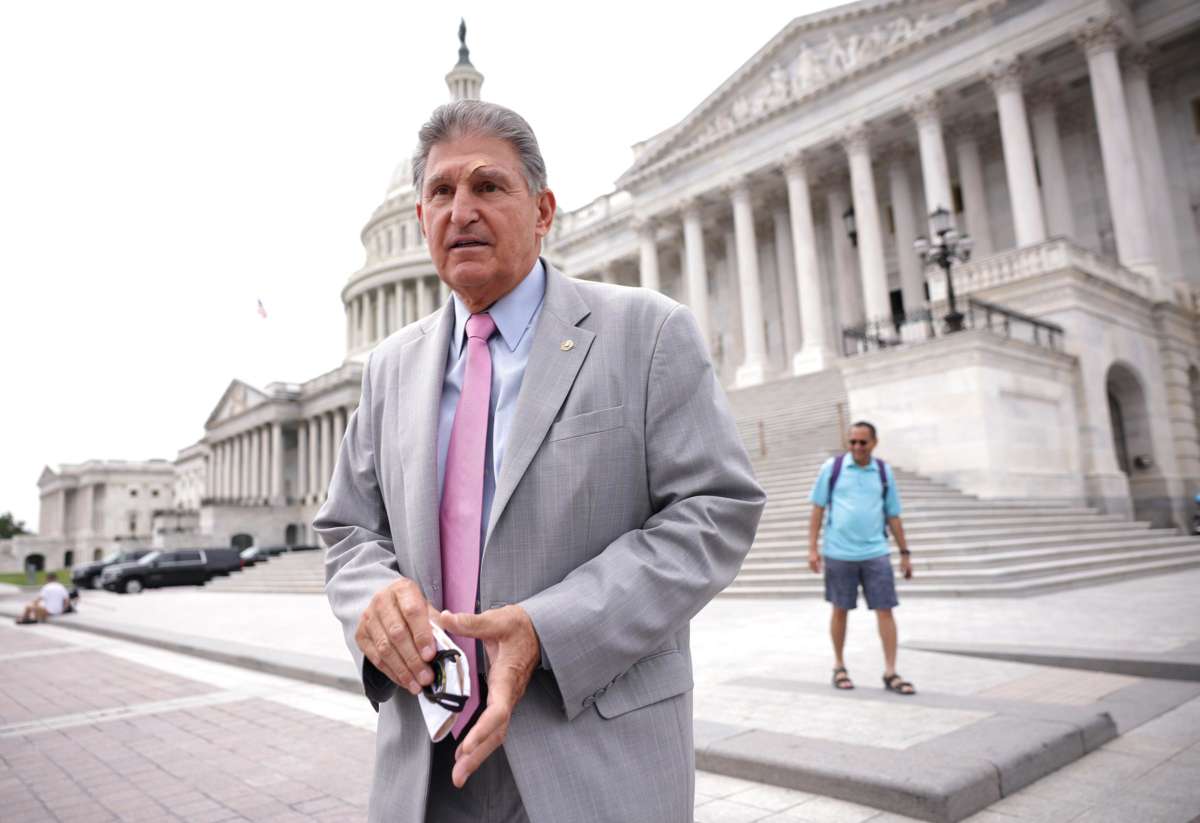Honest, paywall-free news is rare. Please support our boldly independent journalism with a donation of any size.
As Democrats and progressives have been working on crafting the $3.5 trillion reconciliation bill, Sen. Joe Manchin (D-West Virginia) has taken a hard stance against the size of the bill. Now he says that he won’t accept a bill larger than $1.5 trillion — and would prefer a price tag as small as $1 trillion instead.
According to Axios, Manchin has told the White House about his specific concerns with the bill. Last week, he wrote in an op-ed that he thinks Democrats and progressives should hit “pause” on the bill and consider “significantly reducing the size of any possible reconciliation bill.”
Manchin evidently has concerns about the scope of some programs like universal preschool, the child tax credit extension, child care tax credits and free community college. Similar to the way he cut down the amount for unemployment checks during stimulus bill negotiations and lowered the income ceiling for people qualifying to receive a stimulus check, the senator thinks that these vital social programs in the reconciliation bill should be subject to means testing.
He is also concerned about the proposal, originally from President Joe Biden, to spend $400 billion to support caretakers, including people who take care of the elderly and people with disabilities. Manchin has said that he doesn’t want to add to the deficit, and evidently doesn’t believe his colleagues who say that the bill will pay for itself.
It’s unclear at this point what other proposals in the bill the West Virginia conservative Democrat is concerned about. With such a disparate price tag from what has been the established size of the bill after prolonged negotiations with centrists, it is fair to assume that Manchin would like much more cut out of the bill.
The senator has said before that he finds climate proposals in the bill “disturbing,” for instance. Echoing the talking points of fossil fuel lobbyists, Manchin says he doesn’t support a drastic reduction in fossil fuel use, which climate science shows is necessary to avoid the worsening impacts of the climate crisis. As it stands, the reconciliation bill is the only bill with major climate proposals that stands a chance of passing into law.
Though Manchin says he is concerned that the bill won’t be fully paid for, he was also part of the bipartisan group of senators that cut nearly every pay-for from the infrastructure package this summer. That package ended up being a fraction of the size that Biden had originally proposed, and didn’t include the original relatively modest taxes on the rich and corporations.
The senator’s objections to the reconciliation bill may be influenced by the massive amount of lobbying that conservative groups are putting into opposing the effort. Groups and corporations representing a wide swath of interests, including Exxon, Pfizer, Disney, and the conservative lobbyist group U.S. Chamber of Commerce, are launching an offensive against the bill. Manchin has documented ties to deep-pocketed lobbyists, including those from Exxon.
Groups like the Chamber of Commerce are trying specifically to eliminate or drastically cut down any tax increases on the rich and corporations. According to The New York Times, while Congress is considering a tax increase on corporations, it is only a very modest one from the current 21 percent to 25 percent, and not a return to the 35 percent that it was before the Republican tax cuts of 2017.
As the Senate has begun drafting the bill, other points of contention have started to make an appearance. Some Democrats, reports CNN, are insistent on repealing the state and local tax deduction (SALT) cap, which experts say would largely benefit the wealthiest individuals in the U.S.
Sen. Bernie Sanders’s (I-Vermont) Medicare expansion, meanwhile, is viewed as costly by some members of the House, according to CNN — even though his proposal to allow Medicare to negotiate drug prices could save the government $500 billion over the next 10 years.
Press freedom is under attack
As Trump cracks down on political speech, independent media is increasingly necessary.
Truthout produces reporting you won’t see in the mainstream: journalism from the frontlines of global conflict, interviews with grassroots movement leaders, high-quality legal analysis and more.
Our work is possible thanks to reader support. Help Truthout catalyze change and social justice — make a tax-deductible monthly or one-time donation today.
